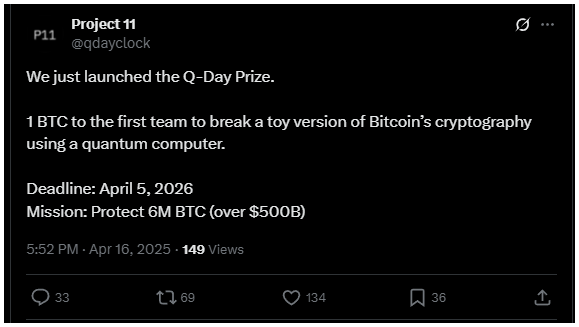Quantum computers might crack Bitcoin’s security way sooner than anyone expected.
Google just dropped a bomb on the crypto industry, the tech giant’s latest research says breaking RSA encryption could take 20 times fewer quantum resources than we thought.
This ain’t sci-fi anymore, it’s knocking at the door.
Willow is Google’s quantum beast that’s stirring the pot
Back in December 2024, Google unveiled a shiny new quantum chip called Willow. This gear can solve problems in five minutes that would take your average supercomputer, wait for it, 10 septillion years.
That’s a number so big, it makes your head spin. Naturally, people started freaking out, could Willow rewrite the Bitcoin blockchain?
Steal Satoshi’s coins? The paranoia was real. It is real.
Craig Gidney, Google’s quantum research whiz, put things into perspective.
“Look, a quantum computer with less than a million noisy qubits could factor a 2048-bit RSA key in under a week.”
Now, that’s a 20-fold drop from previous estimates. Translation? The quantum threat to Bitcoin’s security isn’t some distant nightmare anymore, it’s creeping closer.
The math behind the madness
Google’s team didn’t just build a powerful chip, but they got smarter algorithms, too. They figured out how to do modular exponentiations twice as fast. Whatever this means.
Plus, they improved error correction by tripling the logical qubit density. And here’s a neat trick, the magic state cultivation. Sounds like wizardry, right?
It’s a way to make quantum operations more reliable and efficient without hogging extra resources.
Bitcoin’s security leans on elliptic curve cryptography, which is kinda like RSA’s cousin. So if Google’s quantum machines can bust RSA faster than expected, Bitcoin’s safety timeline just shrank.
Project 11, cracking Bitcoin
And there’s a team, a research group called Project 11, and they’re putting their money where their mouth is.

They launched a Bitcoin bounty, nearly $85,000, for anyone who can crack a simplified version of Bitcoin’s encryption with a quantum computer.
They’re testing smaller keys, from 1 to 25 bits, way less than Bitcoin’s 256-bit fortress, but it’s a start.
They believe Shor’s algorithm on quantum computers will break Bitcoin eventually. The question is how soon.
Google also warns that rivals might already be hoarding encrypted data, waiting to decrypt it once quantum tech is ready.
That’s why Google’s been beefing up encryption in Chrome and internally, switching to post-quantum standards.
The National Institute of Standards and Technology rolled out post-quantum cryptography standards last year, urging a phase-out of vulnerable systems by 2030.
But with Google’s new findings? That deadline might be too cozy.
So, your Bitcoin’s safe, for now. But the quantum storm is brewing, and if you’re holding crypto, you better keep an eye on this. The future’s coming fast, and unfortunately it’s quantum-powered.
Disclosure:This article does not contain investment advice or recommendations. Every investment and trading move involves risk, and readers should conduct their own research when making a decision.
Kriptoworld.com accepts no liability for any errors in the articles or for any financial loss resulting from incorrect information.


